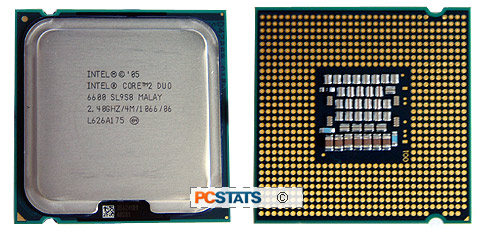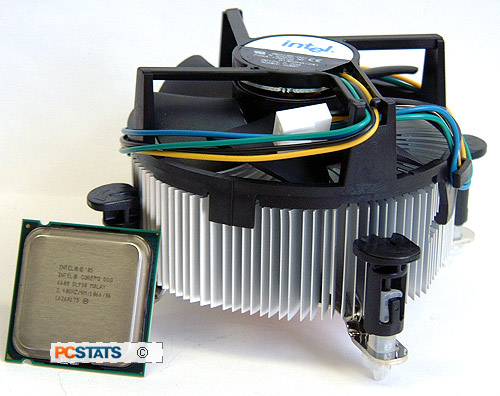Intel's Core 2 Duo processor kicks some major butt. PCSTATS has not seen a jump
in CPU performance like this since... well for as long as we can
remember! When a new processor architecture is released, at first it runs
just slightly faster than the previous generation but
not this time around. As you'll see
in the benchmarks the Core 2 Duo is a good 25% faster than the
Pentium D family. Team that up with the fact that it costs less and consumes
less power, and it is easy to see that Intel has a winner on its
hands.
Microsoft Windows Vista
has high hardware requirements for an operating system, if you're planning on using this OS,
you will probably have to upgrade something in your computer. More
than likely you will need to increase the amount of memory, or drop in a
new processor, DirectX 9.0C videocard or hard drive. To run Windows Vista Ultimate edition, you going
to need a PC that is pretty powerful if you want to use all the
bells and whistles.
Software designed to run on Microsoft Vista should incorporate better SMP (Symmetric MultiProcessing) support so we should start to see the benefits of the multi-core Core 2 Duo processors soon. With that in mind, when you plan
on overhauling your computer or building a new Intel system all together, I think you'll find the Intel Core 2 Duo E6600 a very attractive choice.
When choosing an Intel Core 2 Duo processor, do your homework because
cache size varies between models. For example mainstream oriented Core 2 Duo's come with 2MB
of L2 cache, where as high end models have 4MB L2 cache. Tests have shown many times
over that cache size makes a significant impact on overall performance.
All things
considered equalled, enthusiasts like you are no doubt most attracted to the Intel Core 2 Duo E6600 because it offers the best mix
of cache size and clock speed. The dual-core processor runs on a 1066 MHz FSB, comes
clocked at 2.4 GHz and most importantly has a massive 4MB of L2
cache! The E6600 processor is built on Intel's 65 nanometer manufacturing process and comes in the
Socket 775 form factor.
The Intel Core 2 Duo E6600 has a retail price of $354 CDN ($313 US, £164
GBP). The chip contains technologies like SSE3, Virtualization Technology (VT)
and Enhanced Intel Speed Step Technology (EIST) which we'll discuss in detail
later in the review.
 |
|
|
Intel Core 2 Duo E6600 Processor |
|
|
 |
| Tech
Specs |
Core 2 Duo
E6600
Clock: 2.4
GHz
L1: 32+32KB
L2: 4096KB
Multipiler: 9x
Package:
LGA775
Socket: 775
organic mPGA
Core: 65nm
Vcore:
1.125V-1.3525V
Cost: $313 USD
|
 | |
Like the Intel Pentium 4/D/XE and AMD Athlon64 series of processors, the Intel Core
2 Duo is designed to run both 32 bit and 64 bit software. To
use Intel's latest and greatest chip, you will need a newer generation Socket
775 motherboard. First generation Socket 775 Pentium 4/D/XE motherboards might not
be compatible with the Core 2 Duo because the power requirements are
different. There are a variety of chipsets that
support the Intel Core 2
Duo, including Intel's own 945-series, 965-series and the 975X Express. Third party
chipsets include the VIA PT890, PT880 Ultra, SiS's 662, nVIDIA's nForce 570/590 SLI and nForce
650 Ultra 650i/680i SLI.
Core 2
Duo, including Intel's own 945-series, 965-series and the 975X Express. Third party
chipsets include the VIA PT890, PT880 Ultra, SiS's 662, nVIDIA's nForce 570/590 SLI and nForce
650 Ultra 650i/680i SLI.
Again though just because a motherboard has one of those chipsets does not mean it's compatible with the Core 2 Duo processor,
so check before hand if you are worried about compatibility issues! Motherboard
manufacturers are aware of this issue and most have posted CPU compatibility
charts on their websites.
The Intel Core 2 Duo processor does not
draw as much power as the previous Pentium 4/D/XE class of CPUs, but do
yourself a favour and equip your PC with an ATX 2.0 spec
power supply. It will need an ESP12V connector, most high end motherboards come with the
8 pin 12V connector now. The Intel E6600 draws 65W as compared to a Pentium 4 940
which draws 95W.
Going hand
in hand with the lower power consumption, Intel Core 2 Duo processor's also do not
generate as much heat as the Intel Pentium 4/D/XE series. The Core 2 Duo is
compatible with all Socket 775 heatsinks on the market, and if you do not plan
to overclock the stock cooler that comes with retail processors is pretty good and
most importantly operates very quietly.

